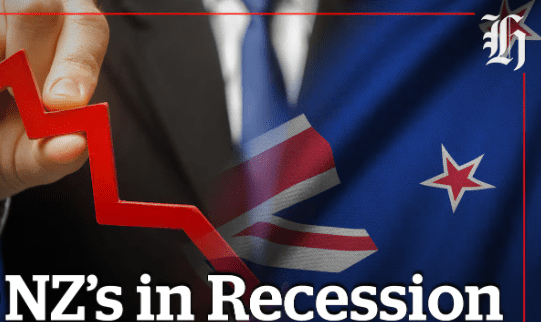New Zealand has gone into its second recession in only 18 months.
Government data released on Thursday revealed this, as severe weather and efforts to control inflation heavily affected the economy.
StatsNZ reported that the output decreased by 0.1 percent at the end of 2023, following a 0.3 percent drop in the previous quarter. New Zealand also experienced a downturn from late 2022 to early 2023.
A recession is typically defined as two consecutive quarters of economic decline.
This time, the impact is being felt all around, with many consumers reducing spending and businesses in various sectors cutting costs and delaying new investments.
Economists and investors largely blamed the central bank, which aggressively raised interest rates to slow down rapidly increasing prices.
However, the effects of Cyclone Gabrielle and severe weather in the country’s north last year also played a significant role.
“They increased interest rates very aggressively. We warned everyone who would listen that interest rates were rising too high, too quickly,” Jarrod Kerr, chief economist for Kiwibank told AFP.
“We have seen a decline as a result,” he added.
The Reserve Bank of New Zealand’s target interest rate was raised 12 times from mid-2021, from 0.25 percent to the current rate of 5.5 percent.
Increases in interest rates are meant to reduce economic activity and alleviate inflationary pressures or price bubbles, but they can also slow down economic growth as money becomes more expensive to borrow.
‘Deep hangover’?
The recent contraction occurred despite a surge in migration, with around 130,000 people arriving in New Zealand last year, increasing the population to 5.3 million.
“That shows how weak the economy is,” Kerr said.
“We have had a surge in population with many migrants coming here. They have increased demand in the economy, and even with that, we are still experiencing a decline.”
StatsNZ reported that wholesale trade had the biggest negative impact on the economy, driven by decreases in grocery and liquor wholesaling.
The retail sector is also struggling, with decreases in furniture, electrical, and hardware retailing.
Vacuum retailer Godfreys announced on Wednesday that it will close all stores in New Zealand and Australia after going into administration.
The 90-year-old business is closing around 141 stores across the two countries, resulting in over 600 staff losing their jobs.
The International Monetary Fund has advised New Zealand to reduce government spending to help combat inflation — a move that could also slow down growth and increase pressure on the central bank to reduce rates.
Finance minister Nicola Willis attributed the shrinking economy to the previous centre-left Labour administration, which was voted out in general elections in October.
“This is a deep hangover from the period of large spending and high taxes under the previous government,” she said. “We are focused on rebuilding our economy after years of economic mismanagement.”
Prime Minister Christopher Luxon stated that as part of a drive to cut costs, jobs will be cut in the public sector, with the ministries of health and primary resources being the first to be affected.
“We need to bring government spending under control,” he told reporters on Thursday.
“We need to adjust its size. It’s a challenging period for people in government and public service.”
Opposition finance spokesperson Barbara Edmonds mentioned that New Zealanders have been dealing with a cost-of-living crisis for a while “and have not yet seen a single policy from the new government to assist them”.
AFP



